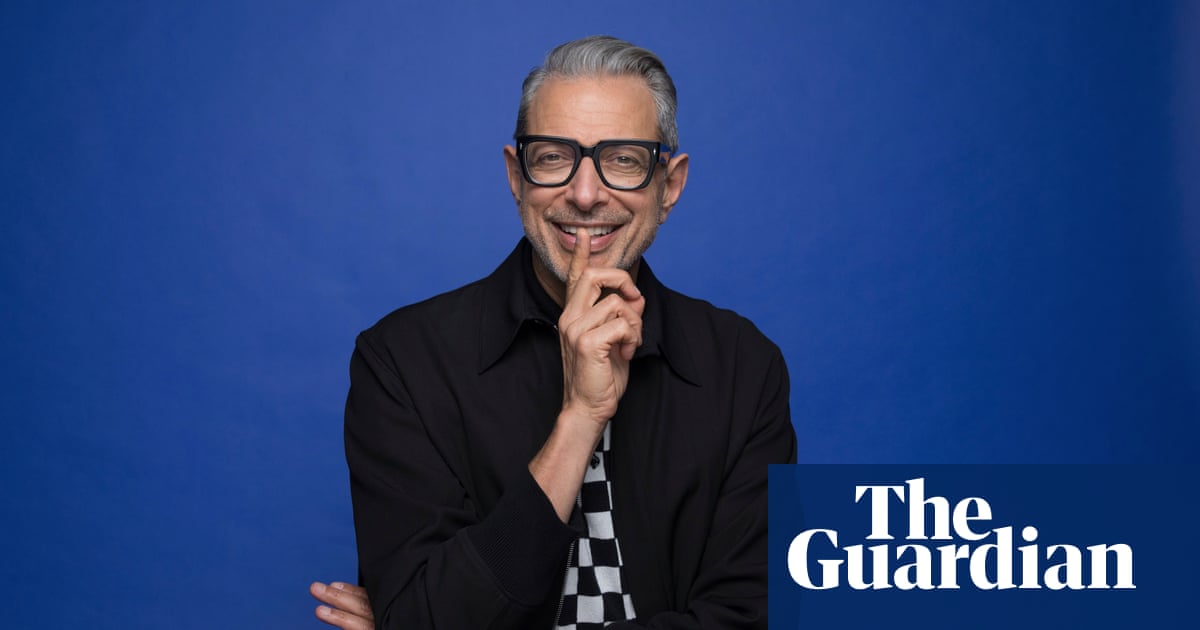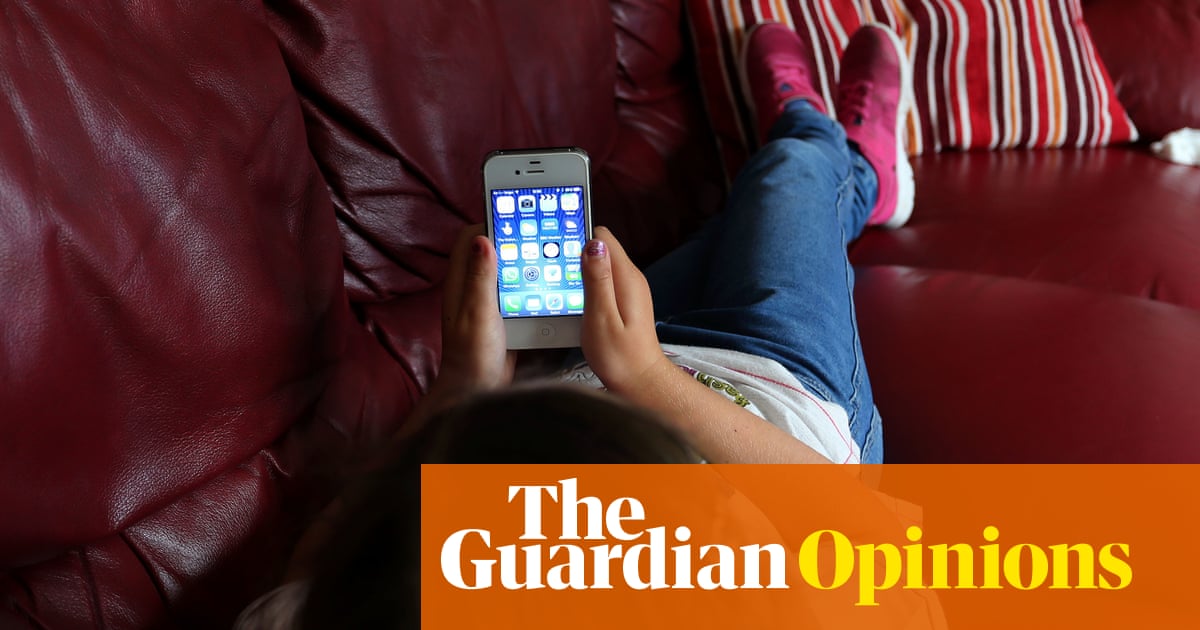
hen the 1975 released the song Frail State of Mind last October, the opening line, “Go outside? Seems unlikely,” felt like a typical Matty Healy lyric: heavy emotions, light touch. Now, he says, it’s one of many moments on the band’s fourth album, Notes on a Conditional Form, that have acquired an uncanny resonance. “This album asks the same question as the last record,” he says. “Can the centre hold? Is this weird? It’s slightly fearful. It’s going to come out at a time when that feels quite justified.”
Well, yes. In a kinder timeline, the 1975 would be headlining US arenas and enjoying the full pre-release hoopla as you read this. So much for that. When lockdown loomed, Healy asked himself where he most wanted to be. Whenever he’s not making music, he has “an inherent lack of purpose”, so he headed straight for the band’s residential studio in Northamptonshire with drummer and co-producer George Daniel. After finishing some production work, the pair started playing around with new 1975 material.
The current situation has seeped into the lyrics – for a songwriter as attuned to society’s background noise as Healy, how could it not? – but he is treading carefully. “Yannis from Foals said the other day there’s no prize for the first person to make the definitive corona album,” Healy says, laughing, when we meet over FaceTime. He is in bunker mode: shaggy hair, baggy shirt, a dusting of stubble, a pack of cigarettes on the go. “I’m not interested in reactive statements. I’m interested in living in an environment and then reflecting what that’s like. I want to see what the conversations are and what people turn into.”
It is a wonder that the 1975 have anything left in the tank after Notes on a Conditional Form. Announced two years ago as a companion piece to the chart-topping, Brit-winning A Brief Inquiry Into Online Relationships, its 22 songs have taken 19 months in 15 studios in four countries. Longer than Fleetwood Mac’s Tusk and just a few minutes shy of the Beatles’ White Album, it features, among other things, Greta Thunberg, FKA twigs, a duet with Phoebe Bridgers about repressed homosexuality in middle America, a country-rock tour diary, a shoegazer’s love song, a house banger fronted by Cutty Ranks, and a song written by Healy’s dad 30 years ago. The governing themes, says Healy, are “anxiety, violence and unattainable beauty”.
He thinks it is the best 1975 album; it’s certainly the most 1975 album. Far from your typical radio-friendly unit-shifter, it doubles down on the band’s reputation for sounding like anything and withholding nothing: an inevitable consequence of their frontman’s whirling brain. Thoughts fly off him like sparks from a wheel. If this compulsion to say whatever is on his mind makes him a divisive figure – to some the mood board for a generation, to others a pretentious motormouth – then so be it. “I’m not an avocado,” he says, accurately. “Not everyone thinks I’m amazing.”
There was no masterplan to make a record this expansive; they just didn’t want to stop. “I was chatting with Brian Eno about this the other day,” Healy says, half-apologising for the namedrop (he has interviewed Eno for a new podcast series). “I’ve been in the same band for 17 years. We make records and we live together. So it’s not striving to be bold; it’s avoiding being bored.”
The final track, Guys, is a sweet love song dedicated to the band he formed at Wilmslow high school in Cheshire: “The best thing that ever happened.” This is the first album where he has allowed himself to look back. “There’s a lot of talking about life in your 30s on this record,” says Healy, who turned 31 in April. “Like All My Friends by LCD Soundsystem: looking at my scene looking back on itself.” That means reflecting on his life and the choices he has made. “My 20s was fucking chaos and I didn’t live a domestic life so there are lots of things I’ve just not learned. I’m not emotionally very mature. There have been times when it does damage my relationships [he split up with the model Gabriella Brooks last summer] and I ask myself: ‘Why do I value my career so much?’ I’m trying to relinquish that idea. I want to have a period in my life when I’m not conflicted about it.”
Healy says he is trying to avoid any activity that doesn’t actively serve the 1975’s music. In March, he tweeted a spiky joke about social media (“Stop telling people to support you we don’t want your EP and zine bundle right now Laura we’re going to die”) that prompted accusations of obnoxious privilege and made him want to keep quiet. “Maybe that was my last venture on to Twitter,” he says. “It’s not that I’ve been burned by it – I don’t give a fuck, I get cancelled every week – it’s that I’m more interested in my longform statement. I’m comfortable putting out a record but not comfortable promoting myself. The idea of superficial self-promotion really stings people’s eyes at the moment because it feels frivolous.”
The current crisis of purpose among celebrities fascinates him. As the son of two tabloid-haunted actors, Tim Healy and Denise Welch, he says he never found fame exotic. If anything, it seemed a drag. “I don’t feel the need to be present in the culture unless I have a song out. A lot of artists have found that this enormous void has been created and think: ‘What can I do to take up the space I normally did? I’ll do a cover of Elton John on Instagram.’ It’s created this new culture of content. I’m lucky that I have an album coming out and it is an album about this time and these kinds of ideas.”
Recently, Healy has attracted more intense scrutiny by becoming more politically outspoken. Since the 1975 released the first two tracks from the new album last summer – the protest-punk bottle-rocket People and a Greta Thunberg monologue set to music – he is expected to take a position on everything. When you are celebrated for spraying opinions like a firehose, your omissions raise suspicions. He thinks the funniest line on the album comes from Roadkill: “I took shit for being quiet during the election and maybe that’s fair, but I’m a busy guy.”
“To be honest with you I was so disillusioned,” he says. “I don’t like Jeremy Corbyn, I don’t like Boris Johnson, I didn’t trust either of them. My point is: yeah, I know, but I’m doing my bit. Start on someone else.” Pick your battles, he advises other artists, but do pick something. “If you want to get involved in creating stuff, be prepared to say something because people are feeling a real sense of pointlessness. I think after this there’s going to be a postwar feeling. I can’t imagine something superficial changing the world.”
This is the kind of grand pronouncement that aggravates the sceptics, but Healy is often his own sharpest critic. He uses dialogue in his songs – half-real, half-invented – to interrogate himself. Integral to his commitment to honesty and self-awareness (“If you’re making art, the bits you want to leave out are probably the bits you should put in”) is the knowledge that honesty and self-awareness can turn into just another shtick if you are not careful. “People who overshare because they think it’s endearing can be quite exhausting. Self-deprecation is fine if it’s real but anything performative is annoying. If people feel like you’re curating their perspective of you they think: fuck off, just tell me the truth.”
These days, much of that personality curation takes place online. Healy is one of few songwriters who can examine internet culture without rendering you paralysed by embarrassment, because his music sounds the way the modern world feels: overstimulated, lurching between excitement and anxiety. “The overarching theme on my records is communication and conversation,” he says. “God, heaven, hell, reincarnation … they’re all amazing ideas but the only thing that’s actually going to happen is this: me and you, talking and thinking about it. How we do that and why we do that is all I’m really interested in.”
Now, we are being forced to live online like never before – a development that Healy finds surprisingly benign. “It’s almost approaching the utopian, original idea of the internet, which is the extension of pre-existing relationships. The internet is a massive social experiment that’s given us the freedom to do anything, and it seems like what we want is an environment for our anger and anxiety, but that’s not what it was invented for.”
Healy has also been thinking about how music will change. Before the crisis, many artists were talking about reimagining live music in a more environmentally sustainable way. Healy, who has junked the current 1975 stage show, thinks that the industry’s hard reboot will force their hands. “The gig’s up. It’s done,” he says, waving his cigarette. “We need to fucking change the world. In live music, the doors aren’t going to be kicked from the outside. They’re going to be kicked from the inside by people like me and Alex Turner and Dua Lipa. It’s about sacrificing the way things used to work because they don’t work any more.”
They certainly don’t work right now. For the 1975, the hard sell that attends a major release has come to a halt. No more gigs, TV appearances, billboard campaigns. Notes on a Conditional Form will simply appear online and stand or fall on its own merits. Healy has made his peace with that.
“It’s important to me that this record feels like it came out at a different time. What people are excited about now is fundamental shit, like going for a walk, like being able to see their mum. So it’s eclipsed all the superficial dances you usually do around a record.” In a way this feels apt. “I have been obsessed with the idea of the end of an era and going into a new decade. This fucking feels like it. We’re in a new world.”












